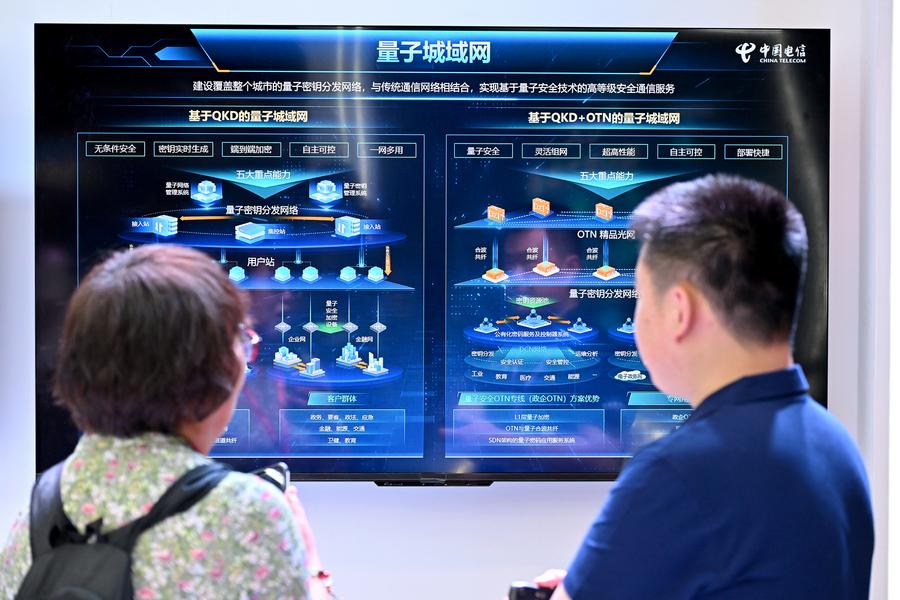发布日期:2025-01-07 18:29 点击次数:114

BEIJING, Sept. 12 (Xinhua) -- The planned U.S. restrictions on exports of advanced technologies彩娱乐官网, including those in the fields of quantum computing and semiconductor manufacturing, will not stop China's sci-tech innovation. On the contrary, they will reinforce China's determination to pursue independent innovation.
The U.S. Commerce Department's Bureau of Industry and Security recently announced its intention to tighten export controls for quantum computing items, advanced semiconductor manufacturing equipment, Gate All-Around Field-Effect Transistor technology and additive manufacturing items, citing "national security" and "foreign policy" concerns.
This has been widely recognized as another U.S. move to contain China's high-tech development. But the notion that a tech blockade can stifle Chinese innovation is fundamentally flawed. History has shown that when it faces external pressure, China, with its vast talent pool, sci-tech resources and commercial market, always rises to the challenge.
The country's remarkable achievements in space exploration illustrate this clearly. Despite U.S. attempts to marginalize it in the field of space, China has made significant strides in its space station and lunar exploration programs, demonstrating the ingenuity and resilience of its sci-tech community and its ability to overcome tech blockades.
那时的我,热衷于组织跑步活动,邀请朋友、同事乃至陌生人一同踏上跑道。每当看到他们因为跑步而绽放出自信的笑容,彩娱乐官网我的内心便充满了满足和喜悦。
于是,在熙熙攘攘的跑步队伍里,我们看到了形形色色的女跑者身影。
China's quantum technology will no doubt grow to prove that tech blockades cannot halt the country's sci-tech progress. According to U.S. tech policy think tank ITIF彩娱乐官网, China leads the world in the field of quantum communication and is level with the United States in quantum sensing technology.
China is also advancing steadily in the field of quantum computing. Origin Wukong, a third-generation superconducting quantum computer developed domestically by Chinese startup Origin Quantum, is equipped with the Wukong chip, which has 198 qubits comprising 72 computational qubits and 126 coupler qubits.
Origin Quantum says it has core technologies in the field and a complete manufacturing chain, covering research and development, design, production, and testing.
"The U.S. blockade has made us more resolved to follow a path of independent innovation," said Jia Zhilong, who leads the company's chip development.
Moreover, the United States would incur significant losses from such restrictive policies. The interdependence of global supply chains is a cornerstone of modern economic growth. By limiting exports of cutting-edge technologies, the United States not only risks alienating key trading partners but also stifles its own industries that rely on global markets for revenue and innovation.
According to statistics from the U.S. Semiconductor Industry Association (SIA), China is the world's largest single semiconductor market, accounting for 29 percent of the global market in 2023. Chinese firms remain key clients for many leading semiconductor companies, including those located in the United States.
Nvidia CFO Colette Kress once warned that in the long term, restrictions on China will "result in a permanent loss of opportunities for the U.S. chip industry." And Dutch chip equipment supplier ASML's CEO Christophe Fouquet has noted his expectation that pushback from industry insiders and observers will grow.
Just as a Chinese foreign ministry spokesperson has said, obstructing normal tech cooperation as well as trade and economic exchange violates market economy principles, destabilizes global industrial and supply chains, and serves no one's interests.
By restricting the flow of technology, the United States is also slowing global sci-tech development, as the exchange of ideas and resources is a vital component of progress.
In sharp contrast, China is embracing international cooperation and sharing technology with other countries, including the United States. Origin Wukong has been accessible globally and free-of-charge since its launch in January. It has since received more than 14 million remote visits from around the world and completed over 260,000 quantum computing tasks, with the highest number of users outside of China located in the United States.
Technological progress is not just a national mission but a collective endeavor of humanity. Technological breakthroughs, such as improved health care, enhanced communication and the more efficient use of energy, benefit all people.
The future of technology should be a beacon of hope for all彩娱乐官网, not a tool for division or dominance to be used by a few. It is time to embrace a more inclusive approach to technology -- one that recognizes the value of shared innovation and the potential of collective growth. ■